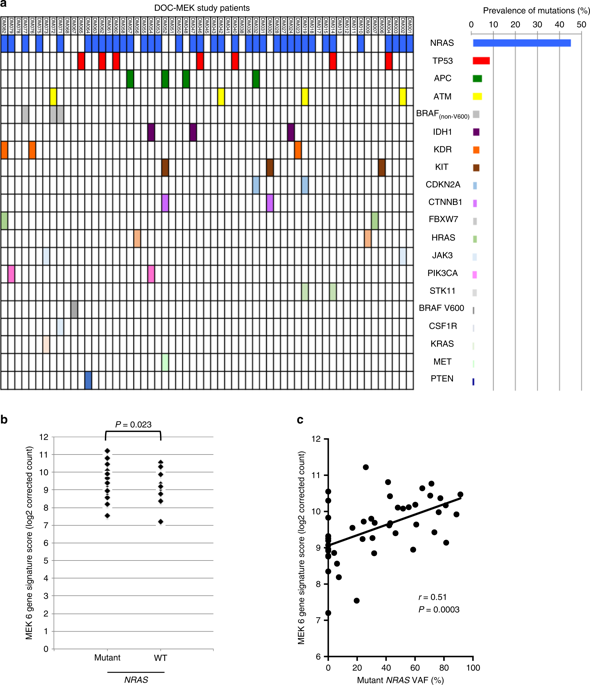当前位置:
X-MOL 学术
›
Br. J. Cancer
›
论文详情
Our official English website, www.x-mol.net, welcomes your
feedback! (Note: you will need to create a separate account there.)
Dual-specificity protein phosphatase DUSP4 regulates response to MEK inhibition in BRAF wild-type melanoma.
British Journal of Cancer ( IF 6.4 ) Pub Date : 2019-12-16 , DOI: 10.1038/s41416-019-0673-5 Avinash Gupta 1, 2 , Christopher Towers 2 , Frances Willenbrock 2 , Roz Brant 3 , Darren Richard Hodgson 3 , Alan Sharpe 4 , Paul Smith 5 , Anthony Cutts 6 , Anna Schuh 2, 7 , Ruth Asher 8 , Kevin Myers 9 , Sharon Love 10 , Linda Collins 11 , Adelyn Wise 11 , Mark Roy Middleton 2, 7 , Valentine Moya Macaulay 2, 7
British Journal of Cancer ( IF 6.4 ) Pub Date : 2019-12-16 , DOI: 10.1038/s41416-019-0673-5 Avinash Gupta 1, 2 , Christopher Towers 2 , Frances Willenbrock 2 , Roz Brant 3 , Darren Richard Hodgson 3 , Alan Sharpe 4 , Paul Smith 5 , Anthony Cutts 6 , Anna Schuh 2, 7 , Ruth Asher 8 , Kevin Myers 9 , Sharon Love 10 , Linda Collins 11 , Adelyn Wise 11 , Mark Roy Middleton 2, 7 , Valentine Moya Macaulay 2, 7
Affiliation

|
BACKGROUND
Aiming to improve treatment options for BRAF wild-type melanoma, we previously conducted the DOC-MEK study of docetaxel with MEK inhibitor (MEKi) selumetinib or placebo, revealing trends to prolongation of progression-free survival (hazard ratio 0.75, P = 0.130), and improved response rates (32% vs 14%, P = 0.059) with docetaxel plus selumetinib. NRAS status did not associate with outcome. Here, the aim was to identify novel biomarkers of response to MEKi.
METHODS
A MEK 6 gene signature was quantified using NanoString and correlated with clinical outcomes. Two components of the gene signature were investigated by gene silencing in BRAF/NRAS wild-type melanoma cells.
RESULTS
In melanomas of patients on the selumetinib but not the placebo arm, two gene signature components, dual-specificity protein phosphatase 4 (DUSP4) and ETS translocation variant 4 (ETV4), were expressed more highly in responders than non-responders. In vitro, ETV4 depletion inhibited cell survival but did not influence sensitivity to MEKi selumetinib or trametinib. In contrast, DUSP4-depleted cells showed enhanced cell survival and increased resistance to both selumetinib and trametinib.
CONCLUSIONS
ETV4 and DUSP4 associated with clinical response to docetaxel plus selumetinib. DUSP4 depletion induced MEKi resistance, suggesting that DUSP4 is not only a biomarker but also a mediator of MEKi sensitivity.
CLINICAL TRIAL REGISTRATION
DOC-MEK (EudraCT no: 2009-018153-23).
中文翻译:

双特异性蛋白磷酸酶 DUSP4 调节 BRAF 野生型黑色素瘤对 MEK 抑制的反应。
背景 为了改善 BRAF 野生型黑色素瘤的治疗选择,我们之前进行了多西紫杉醇与 MEK 抑制剂 (MEKi) selumetinib 或安慰剂的 DOC-MEK 研究,揭示了无进展生存期延长的趋势(风险比 0.75,P = 0.130 ),以及多西他赛加司美替尼的缓解率提高(32% 对 14%,P = 0.059)。NRAS 状态与结果无关。在这里,目的是确定对 MEKi 反应的新生物标志物。方法 使用 NanoString 对 MEK 6 基因特征进行量化,并将其与临床结果相关联。通过在 BRAF/NRAS 野生型黑色素瘤细胞中进行基因沉默研究基因特征的两个组成部分。结果 在使用 selumetinib 而不是安慰剂组的患者的黑色素瘤中,两个基因特征成分,双特异性蛋白磷酸酶 4 (DUSP4) 和 ETS 易位变体 4 (ETV4) 在应答者中的表达高于非应答者。在体外,ETV4 耗竭抑制细胞存活,但不影响对 MEKi selumetinib 或 trametinib 的敏感性。相比之下,DUSP4 耗尽的细胞显示出增强的细胞存活率以及对 selumetinib 和 trametinib 的耐药性增加。结论 ETV4 和 DUSP4 与多西他赛联合司美替尼的临床反应相关。DUSP4 耗竭诱导 MEKi 抗性,表明 DUSP4 不仅是生物标志物,还是 MEKi 敏感性的介质。临床试验注册 DOC-MEK(EudraCT 编号:2009-018153-23)。ETV4 耗竭抑制细胞存活,但不影响对 MEKi selumetinib 或 trametinib 的敏感性。相比之下,DUSP4 耗尽的细胞显示出增强的细胞存活率以及对 selumetinib 和 trametinib 的耐药性增加。结论 ETV4 和 DUSP4 与多西他赛联合司美替尼的临床反应相关。DUSP4 耗竭诱导 MEKi 抗性,表明 DUSP4 不仅是生物标志物,还是 MEKi 敏感性的介质。临床试验注册 DOC-MEK(EudraCT 编号:2009-018153-23)。ETV4 耗竭抑制细胞存活,但不影响对 MEKi selumetinib 或 trametinib 的敏感性。相比之下,DUSP4 耗尽的细胞显示出增强的细胞存活率以及对 selumetinib 和 trametinib 的耐药性增加。结论 ETV4 和 DUSP4 与多西他赛联合司美替尼的临床反应相关。DUSP4 耗竭诱导 MEKi 抗性,表明 DUSP4 不仅是生物标志物,还是 MEKi 敏感性的介质。临床试验注册 DOC-MEK(EudraCT 编号:2009-018153-23)。这表明 DUSP4 不仅是一种生物标志物,而且还是 MEKi 敏感性的介质。临床试验注册 DOC-MEK(EudraCT 编号:2009-018153-23)。这表明 DUSP4 不仅是一种生物标志物,而且还是 MEKi 敏感性的介质。临床试验注册 DOC-MEK(EudraCT 编号:2009-018153-23)。
更新日期:2019-12-17
中文翻译:

双特异性蛋白磷酸酶 DUSP4 调节 BRAF 野生型黑色素瘤对 MEK 抑制的反应。
背景 为了改善 BRAF 野生型黑色素瘤的治疗选择,我们之前进行了多西紫杉醇与 MEK 抑制剂 (MEKi) selumetinib 或安慰剂的 DOC-MEK 研究,揭示了无进展生存期延长的趋势(风险比 0.75,P = 0.130 ),以及多西他赛加司美替尼的缓解率提高(32% 对 14%,P = 0.059)。NRAS 状态与结果无关。在这里,目的是确定对 MEKi 反应的新生物标志物。方法 使用 NanoString 对 MEK 6 基因特征进行量化,并将其与临床结果相关联。通过在 BRAF/NRAS 野生型黑色素瘤细胞中进行基因沉默研究基因特征的两个组成部分。结果 在使用 selumetinib 而不是安慰剂组的患者的黑色素瘤中,两个基因特征成分,双特异性蛋白磷酸酶 4 (DUSP4) 和 ETS 易位变体 4 (ETV4) 在应答者中的表达高于非应答者。在体外,ETV4 耗竭抑制细胞存活,但不影响对 MEKi selumetinib 或 trametinib 的敏感性。相比之下,DUSP4 耗尽的细胞显示出增强的细胞存活率以及对 selumetinib 和 trametinib 的耐药性增加。结论 ETV4 和 DUSP4 与多西他赛联合司美替尼的临床反应相关。DUSP4 耗竭诱导 MEKi 抗性,表明 DUSP4 不仅是生物标志物,还是 MEKi 敏感性的介质。临床试验注册 DOC-MEK(EudraCT 编号:2009-018153-23)。ETV4 耗竭抑制细胞存活,但不影响对 MEKi selumetinib 或 trametinib 的敏感性。相比之下,DUSP4 耗尽的细胞显示出增强的细胞存活率以及对 selumetinib 和 trametinib 的耐药性增加。结论 ETV4 和 DUSP4 与多西他赛联合司美替尼的临床反应相关。DUSP4 耗竭诱导 MEKi 抗性,表明 DUSP4 不仅是生物标志物,还是 MEKi 敏感性的介质。临床试验注册 DOC-MEK(EudraCT 编号:2009-018153-23)。ETV4 耗竭抑制细胞存活,但不影响对 MEKi selumetinib 或 trametinib 的敏感性。相比之下,DUSP4 耗尽的细胞显示出增强的细胞存活率以及对 selumetinib 和 trametinib 的耐药性增加。结论 ETV4 和 DUSP4 与多西他赛联合司美替尼的临床反应相关。DUSP4 耗竭诱导 MEKi 抗性,表明 DUSP4 不仅是生物标志物,还是 MEKi 敏感性的介质。临床试验注册 DOC-MEK(EudraCT 编号:2009-018153-23)。这表明 DUSP4 不仅是一种生物标志物,而且还是 MEKi 敏感性的介质。临床试验注册 DOC-MEK(EudraCT 编号:2009-018153-23)。这表明 DUSP4 不仅是一种生物标志物,而且还是 MEKi 敏感性的介质。临床试验注册 DOC-MEK(EudraCT 编号:2009-018153-23)。











































 京公网安备 11010802027423号
京公网安备 11010802027423号